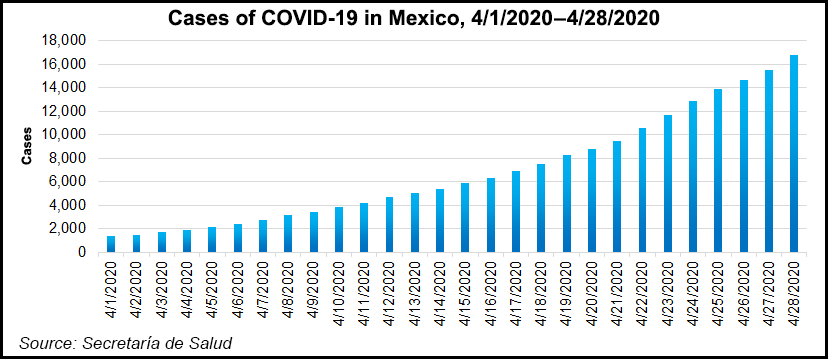Regulatory | Coronavirus | NGI All News Access | NGI The Weekly Gas Market Report
Mexico Worries Mount as Coronavirus Cases Rise and Lockdown Extends Through End-May
Mexico has now entered into Phase 3 of the coronavirus lockdown, the highest level mandated by the government as the spread of the virus intensifies, with nonessential businesses shuttered and social distancing measures and movement restrictions in place until May 30.

Cases have soared in Mexico, to 16,752 as of Wednesday, from barely 1,000 at the start of April. It’s the fourth highest case count in Latin America behind Brazil (74,493), Peru (33,931), and Ecuador (24,258), according to Johns Hopkins University. Mexico’s death toll of 1,569 is second only to Brazil’s 5,158 in Latin America.
But officials have suggested the true number could be many times that; some private hospitals in Mexico City have reportedly reached capacity, and have had to turn away patients due to a lack of ventilators.
Meanwhile economic projections for the country are dire. Already in a recession, the International Monetary Fund (IMF) expects Mexico’s gross domestic product (GDP) to contract by 6.6% in 2020, second worst in Latin America behind only Venezuela.
On Wednesday, the U.S. Commerce Department said that GDP in the United States fell by 4.8% in the first quarter, and Mexico’s economy is deeply intertwined with its northern neighbors. Mexico sends some 75% of its exports to the United States.
The U.S.-Mexico border has been shut to all non-essential travel since April 20 and the bilateral order is set to remain in place until May 19.
With this as a backdrop, Mexico’s Consejo Coordinador Empresarial (CCE) this week organized a virtual meeting with representatives of the government, businessmen and industry groups to discuss the importance of slowly reopening closed supply chain industries while keeping strict social distancing and hygiene measures in place.
The president of Mexican industrial group Confederación de Cámaras Industriales de los Estados Unidos Mexicanos (Concamin), Francisco Cervantes Díaz, said that it was crucial to understand and maintain Mexico’s key role in the supply chain in the global economy.
“We are the eleventh largest economy in the world, the fourth largest auto producer, the fifteenth largest export economy and the leading trading partner of the United States,” he said, adding that it was also an essential source of labor for Mexico’s workforce.
Opposition Senator Verónica Martínez García of the Partido Revolucionario Institucional (PRI) said that confusion existed around what was considered as an ”essential’ business. “Many activities which have been classified as nonessential really are indispensable.”
Shuttered industries have also taken their toll on the natural gas market, with gas demand on the Sistrangas national pipeline system down 10-20%, and natural gas imports from the United States off some 500 MMcf/d, or about 10%.
Since early April, immediately after Phase 1 of the coronavirus contingency plan began, Mexican imports from the United States have dropped to below the 4.7 Bcf/d mark, according to Genscape Inc., compared to a year-to-date average as of late March, or right before stay-at-home measures were put in place, of slightly above 5.2 Bcf/d.
“Yes, other factors were at play during the April 2-17 period, such as programmed maintenance works and the Semana Santa holiday week,” Genscape analyst Ricardo Falcon told NGI’s Mexico GPI. “However, from April 18 onward, the weakness we see in total imports can be largely attributed to demand destruction caused by the pandemic.”
During an earnings call last week, Infraestructura Energética Nova (IEnova) CEO Tania Ortiz said that some industrial customers receiving gas in Mexico had indicated difficulties due to the economic impacts of the coronavirus shutdown and that IEnova wanted to “work together with our customers through this hard time.”
Mexico’s president Andrés Manuel López Obrador, sticking to his pledge of austerity, meanwhile has been criticized for not doing enough to bolster the economy during unprecedented times. The IMF has said that of all the countries in Latin America and the Caribbean, only the Bahamas is spending less than Mexico on economic stimulus in the face of Covid-19.
During his daily press conference Wednesday morning, López Obrador said that there were sufficient hospital beds in the country and that 700 additional ventilators would arrive by the end of May.
He added that his administration “had begun discussions” with private industry and representatives from the United States and Canada on plans for economic reopening.
© 2024 Natural Gas Intelligence. All rights reserved.
ISSN © 2577-9877 | ISSN © 2577-9966 | ISSN © 1532-1266 |
